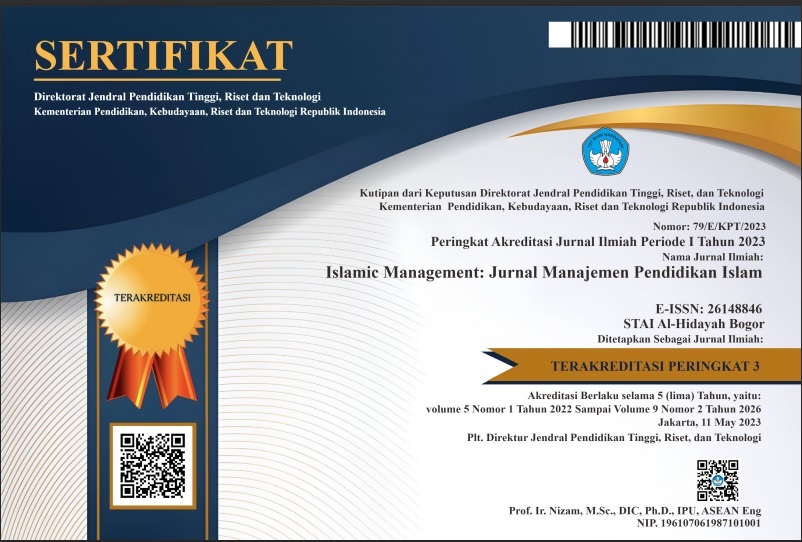MODEL OF ISLAMIC EDUCATION MANAGEMENT IN FORMING STUDENTS MORALS: STUDY RESEARCH IN MIDDLE SCHOOL OF PUSPANEGARA CITEUREUP
DOI:
https://doi.org/10.30868/im.v3i2.756Abstract
This study aims to determine the ideal pattern of Islamic education management in shaping student morals. The approach used is a qualitative approach, data collection techniques using the method of observation, interviews and documentation. Data analysis techniques using an interactive model of data reduction, data presentation and verification. The data validity technique uses an extension of participation, perseverance of observation, and triangulation. The results obtained from the study are; 1) the entire management process (planning, implementation, organization, leadership, and supervision / evaluation) of moral education must involve all elements of the school, students' parents or stakeholders. 2) the principal's leadership in carrying out its functions determines the success of education management in forming the morals of students at school. 3) the ability of all subject teachers and extracurricular advisers in integrating learning material with Islamic teaching values. 4) the formation of Islamic culture in the school environment supported by adequate facilities and infrastructure, a conducive school environment and teacher cohesiveness in each activity.
References
Abdillah, Reza Armin Dalimunthe. (2014). Strategi Dan Implementasi Pelaksanaan Pendidikan Karakter Di SMPN 9 Yogyakarya, Vol. V No. 1.
Bayhaqi, Imam. (2003). As-Sunan Al-Kubro, Vol. X, Beirut : Dar Al-Kutub Al-Ilmiyah.
Fathuddin, TM., Natsir. (2008). Kuliah Akhlak, Bogor : Pesantren Baitussalam.
Fattah, Nanang. (2008). Landasan Manajemen Pendidikan, Bandung : Rosda.
Handayani, Sulha. (2018). Pengguna Narkoba Di Indonesia Capai 5.1 Juta Jiwa, http://www.netralnews.com/news/kesra/read/133189/pengguna.narkoba.di.indonesia.capai.5.1selasa, 28 Maret 2018 (diakses 2 April 2018)
Hidayat, Ara dan Imam Machali. (2012). Pengelolaan Pendidikan : Konsep, Prinsip Dan Aplikasi Dalam Mengelola Sekolah Dan Madrasah, Yogyakarta : Kaukaba.
Kasmawati. (2019). Implementasi Perencanaan Pendidikan Dalam Lembaga Pendidikan Islam, Jurnal Idaarah, Vol. III No. 1.
Muh. Hidayat H. Yusuf. ( 2017). Pengembangan Budaya Organisasi dalam Lembaga Pendidikan, Jurnal Tarbawi, Vol. 14 No.1.
Mulyono. (2009). Manajemen Administrasi dan Organisasi Pendidikan, Yogyakarta: Ar Ruzz Media.
Nata, Abudin. (2003). Manajemen Pendidikan: Mengatasi Kelemahan Pendidikan Islam, Jakarta: Kencana.
Nursanti, Ririn. (2014). Manajemen Peningkatan Akhlak Mulia Di Sekolah Berbasis Islam, Jurnal Kependidikan, Vol. II No. 2.
Puslitdatin. (2019). Penggunaan Narkotika di Kalangan Remaja Meningkat, https://bnn.go.id/penggunaan-narkotika-kalangan-remaja-meningkat/ Senin, 12 Agustus 2019, (diakses 10 November 2019)
Qomar, Mujamil. (2007). Manajemen Pendidikan Islam, Malang : Erlangga.
Ramayulis. (2008). Ilmu Pendidikan Islam, Jakarta : Kalam Mulia.
Saifullah, (2016). Gaya Kepemimpinan Kepala Sekolah Dalam Peningkatan Kinerja Guru Pendidikan Agama Islam Di Sekolah Menengah Pertama Kabupaten Aceh Besar, Jurnal Mudarrisuna, Vol. 6 No. 2.
Shidiq, Rohani. (2015). K.H. Saifuddin Zuhri Mutiara Dari Pesantren, Tanggerang : Pustaka Compass.
Sutikno, M. Shobri. (2012) Manajemen Pendidikan: langkah praktis mewujudkan lembaga pendidikan yang unggul, Lombok : Holistica.
Suryosubroto. (2004) Manajemen Pendidikan di Sekolah, Jakarta : Rineka cipta.
Syafri, U.A. (2014). Pendidikan Karakter Berbasis Al-Qur’an. Jakarta: Rajawali Pers.
Syafruddin. (2005) Manajemen Lembaga Pendidikan Islam, Ciputat : Ciputat Press.
Usman, Husaini. (2009) Manajemen Teori, Praktik dan Riset Pendidikan, Jakarta : Bumi Aksara.
Downloads
Published
How to Cite
Issue
Section
Citation Check
License
Authors who publish with this journal agree to the following terms:
- Authors retain copyright and grant the journal right of first publication with the work simultaneously licensed under a Creative Commons Attribution License that allows others to share the work with an acknowledgment of the work's authorship and initial publication in this journal.
- Authors are able to enter into separate, additional contractual arrangements for the non-exclusive distribution of the journal's published version of the work (e.g., post it to an institutional repository or publish it in a book), with an acknowledgment of its initial publication in this journal.
- Authors are permitted and encouraged to post their work online (e.g., in institutional repositories or on their website) prior to and during the submission process, as it can lead to productive exchanges, as well as earlier and greater citation of published work (See The Effect of Open Access).






